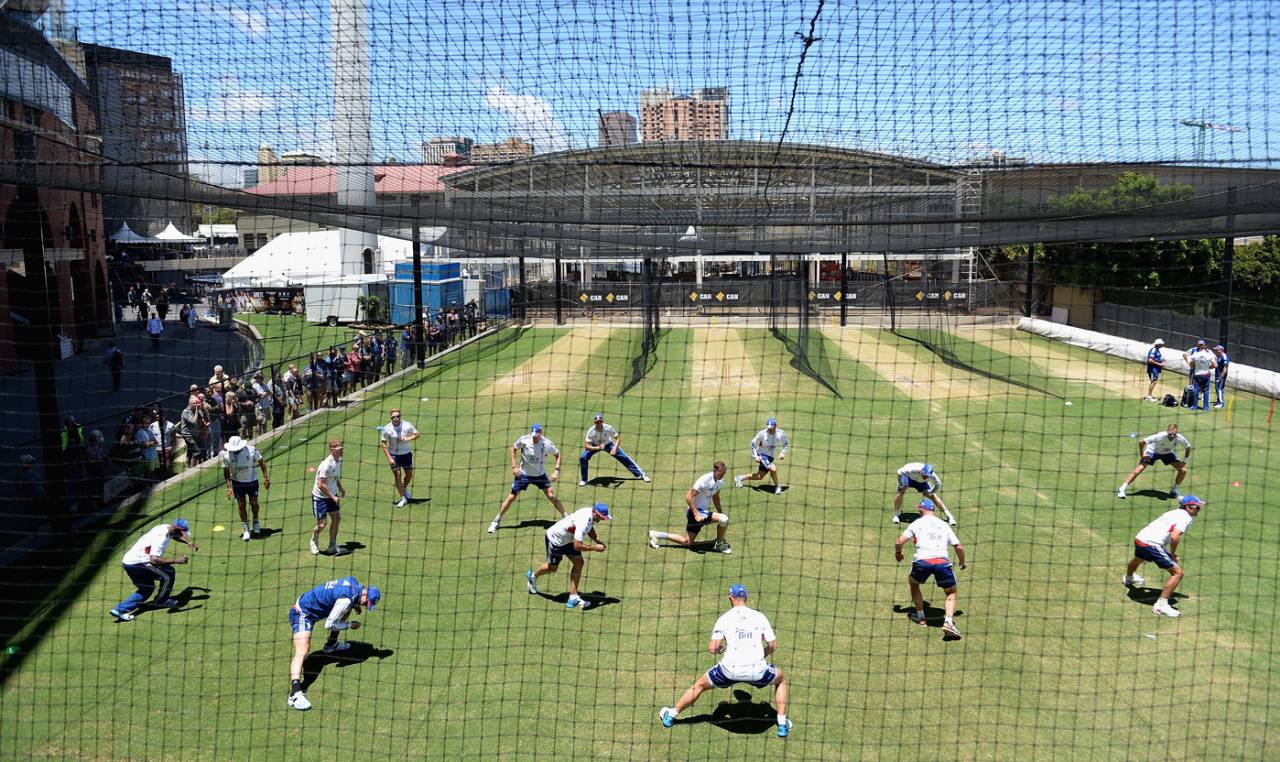The comeback
Just as Mitchell Johnson has risen from the ashes of cricket ignominy and ridicule, England need a new hero of the hour to inspire their fightback
Nicholas Hogg
04-Dec-2013

England's fightback is ultimately up to individuals • Getty Images
We love a comeback. We love to see the knocked-out boxer staggering to his feet, or the aged singer performing for one last night. Muhammad Ali got back into the ring after being exiled for refusing the draft, was floored by Joe Frazier, and then made yet another comeback to reclaim his title. Elvis Presley, after a seven-year absence from the stage, squeezed into a suit of black leather and resurrected himself to again rock the world.
Both stars made their names with roaring returns.
Now Mitchell Johnson has made a successful comeback, and Jonathan Trott has one ahead of him.
And so do a beleaguered England. One-nil down with the odds rapidly shortening on holding on to that little urn. Time for the fightback. The phoenix from the ashes - literally. Ashes history is littered with unlikely winners. In 1894, England followed on in the first Test, in Sydney, and looked ripe for embarrassment until Yorkshireman Bobby Peel bowled the tourists to a shock 10-run victory with 6 for 67. In that same enthralling series, a contest rivalling the DVD-supported 2005 Greatest Ashes, England went 2-0 up before the Aussies won Tests three and four and had the Poms on the rack at the MCG. Needing 297 to cruise home champions, England captain Andrew Stoddart fell first ball. With the tone of Winston Churchill rallying the Allied Forces, Tom Horan reported in the Australasian: "I doubt whether two batsmen ever faced the music with a heavier responsibility on them than Ward and Brown."
And what a burden these two men shouldered. The pair put on 210 for the third wicket, with Brown racing to his ton in a record 91 minutes. England clinched the series 3-2, fighting off the Aussie comeback that was four wickets away from overturning a two-game lead.
The moustachioed heroes of 1894 were obviously men of character. To have walked out on to the MCG under fire from thousands of Australian fans and hold their mettle took courage and nerve.
The sort of character England will need to get back up and fight in the current series.
Before Trott's departure I'd have put him forward as the man to depend on. The Rock. The resolute soldier digging in. "Walking out to bat like some indestructible Victorian father," as Barney Ronay described him in the Guardian. However, what we know of professional cricket from our sofa is far from standing on the popping crease in the crosshairs. "It is the ultimate test of your ability, character and mental strength," reiterated former England captain Alec Stewart.
Cricket had become too important for Trott, too crucial. Steve Harmison backed his erstwhile team-mate up by stating happiness is more important than a bat and ball. And if the game for Trott had become a trial rather than a thrilling career, perhaps it's Michael Carberry who can step up and mount the charge. He has already led his own return from hospital bed to England dressing room, and counts himself "lucky just to be on this planet". As an England supporter I'm hoping Carberry's perspective and maturity - at 33 years old he's hardly a fledging - will give him the resolve to weather the Johnson storm. "I loved being out there in the battle," he told the post-game press conference, attacking with positives when the hacks were looking to freshen wounds.
So can England 2013 muster and regroup? In the fabled 2005 series they came back from a first-game defeat at Lord's with a stirring victory at Edgbaston. The team was packed to the rafters with fighting tyros - Flintoff, Jones, Harmison and Hoggard, along with "wheelie bin" Ashley Giles engineering his comeback against the press jibes that he wasn't up to international standards. Giles may have only bagged three wickets in the first innings, but those scalps were Ponting, Clarke and Warne.
Whilst the current squad as a whole must rearm - the testing No. 3 spot will surely be filled by either Root or Bell - cricket is a team game fought man to man. The fightback is ultimately up to individuals. Each batsman must stare down his bowling foe, as each bowler must hunt down his wicket. In cricket, unlike many other team sports, one player can win a game single-handedly.
Arguably, one of the greatest ever Test comebacks must be India versus Australia in Kolkata in 2001, when a fine Steve Waugh century was diminished by a mighty 281 by VVS Laxman - ably partnered by a plucky 180 by Rahul Dravid - inspiring Harbhajan Singh to match-winning figures of 6 for 73 and the most unlikely Indian victory. Laxman, though supported by his rallied troops, won the game. As did Botham at Headingley in 1981. True, he needed Willis to gallop down the slope and kick away the Aussie stumps, but the bloodlust had been spiked by the Botham bravura.
Just as Mitchell Johnson has risen from the ashes of cricket ignominy and ridicule, England need a new hero of the hour to inspire their own comeback.
Nicholas Hogg is a co-founder of the Authors Cricket Club. His first novel, Show Me the Sky, was nominated for the IMPAC literary award